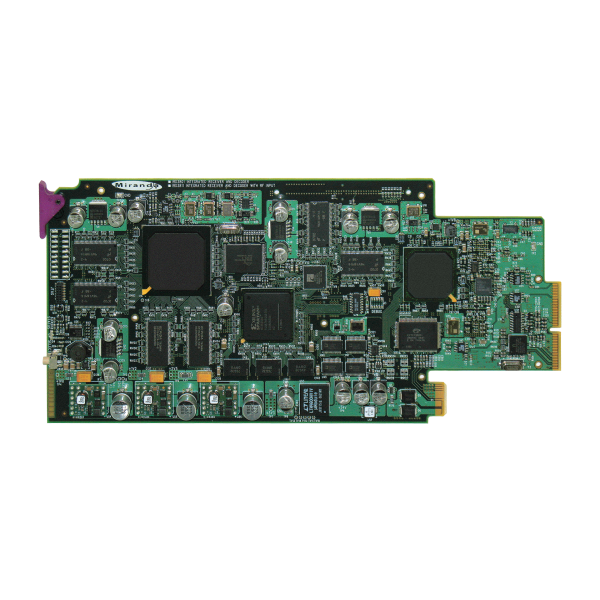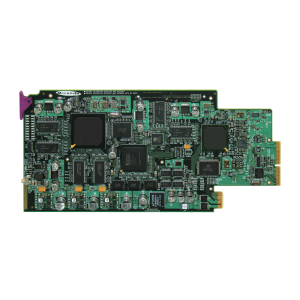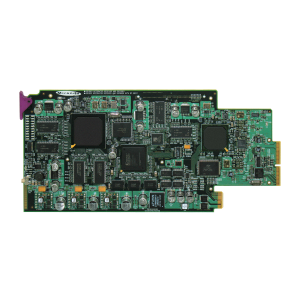Miranda IRD-3811-DVB-S2-CI Integrated receiver/decoder w/ ASI,...
Miranda IRD-3811-DVB-S2-CI Integrated receiver/decoder with ASI, QPSK/8PSK inputs and DVB-CI support - IRD-3811-DVB-S2-CI
The IRD-3811 combines RF demodulation and MPEG-2 decoding of ASI transport streams to either HD or SD. It also offers processing of key video and audio parameters, and signal probing functions for feed aggregation, distribution and monitoring applications by broadcasters and TV services providers. DVB-ASI, ATSC off-air or DVBS/S2 satellite signals fed to the IRD-3811 can be demodulated and decoded to provide either HD or SD video with embedded multichannel audio, in all leading formats, as well as composite video and stereo analog audio for monitoring. The IRD is also available with a DVB-CI slot, supporting leading conditional access systems, and allowing descrambling of multiple encrypted services. With its optional Gigabit Ethernet port, the IRD-3811 can also act as a gateway, by performing IP encapsulation of the input transport stream in either RTP or UDP mode.
Key Features
Input/output versatility- Single 8-VSB or QPSK/8PSK RF input
- Single ASI transport stream input
- Single ASI transport stream output for signal monitoring or retransmission
- Optional IP transport stream output: ASI signal can be re-transmitted as IP. IRD acts as IP video gateway with forward error correction (FEC) for improved quality
- Dual HD/SD SDI outputs
- Composite video and stereo analog audio monitoring outputs
Conditional access
- DVB-CI common interface slot allow descrambling of multiple programs
- Supports BISS-1 with user supplied CAM card
RF input monitoring
- Automatic detection of RF loss
- Convenient auto-scan mode for detection of valid signals
- Monitoring of input signal strength, bit error rate (BER) and carrier to noise ratio (CNR)
Easy input and program selection
- Manual or automatic input selection mode
- Automatic mode allows switching to backup input upon loss of signal on active input, with adjustable duration
- Program selection using local control or iControl
- MPTS automatic program selection mode and recovery
Extensive video format support
- 1920x1080i59.94/50
- 1280x720p59.94/50
- 720x486i59.94 and 720x576i50
Comprehensive dual program audio decoding
- Decoding of MPEG-1 Layer 2 stereo audio
- Decoding of Dolby Digital (AC-3) 2.0 audio
- Optional decoding and embedding of Dolby Digital (AC-3) 5.1 audio to SDI with support of main and associated audio services for up to discrete 8-channel output
- Selectable pass-through of Dolby Digital stream to SDI
- Decoding of AAC-LC Audio for 2/0 and 1/0 coding modes
Frame synchronizer/delay, reference input and video proc
- Supports timing, full phasing and freeze modes
- Reference can be external via BNC, internal using URS or directly from the decoded signal with selectable genlock modes
- Video proc amp functions including, brightness, saturation, hue and contrast
Decoded video format identification
- Identification of key video parameters
- Aspect ratio identification: 16:9 or 4:3
- Video resolution
Audio processing and format identification
- Provides downmix of 5.1 channel to Lt/Rt or Lo/Ro modes
- Extensive Dolby Digital metadata reporting
- Support for secondary audio program (SAP)
- Configurable Dolby Digital dynamic range and compression
- Dolby metadata embedding on SDI (SMPTE 2020-A)
Metadata extraction, display and embedding
- EIA-608 and EIA-708 closed captioning
- WST teletext
- SMPTE 12M timecode
- SMPTE 2016 AFD flag
Extensive PSIP data extraction
- Time and date and other STT data
- VCT, EIT, RRT, TSID
Transport stream probing and alarming
- Transport Stream (TS) monitoring and alarming and settings:
- TR 101 290 priority 1 and priority 2 alarming on key parameters
- Logging of alarms using iControl
- Detailed TS structure reporting using graphical and hierarchical views
- Individual program data statistics, including individual program bit rate, content and PMT data
- IRD generates low-resolution H.264 video proxy and 2-channel audio streams of selected programs for monitoring
Video up/down/crossconversion
- Extensive selection of video format conversions
Specifications
8VSB INPUT (IRD-3811-VQ only)- Quantity/connector: One input with F-type connector, 75Ω
- Tuning range: 51 MHz-858 MHz
- Input level: -27 dBmV to +33 dBmV
QPSK/8PSK INPUT (IRD-3811-DVB-S2 only)
- Quantity/connector: One input with F-type connector, 75Ω
- Demodulation:
- DVB-S (QPSK) ETSI EN 300 421
- DVB-S2 (QPSK/8PSK) ETSI EN 302 307
- Tuning range: 940 to 2150 MHz (in 0.5 MHz steps)
- Symbol rate range:
- DVB-S: 2 to 45 MSymbols/s
- DVB-S2: 10 to 30 MSymbols/s
- Input level: -25 dBm to -65 dBm
ASI INPUT
- Quantity/connector: One input with BNC connector
- Standards: EN50083-9 (V2:3/98) DVB ASI
- Data bit rate: DVB ASI: Up to 80 Mb/s
- Mode: Burst and byte supported
- TS packet length: 188/204 byte packets
- Return loss: >15 dB up to 270 MHz
ASI OUTPUT
- Quantity/connector: One output with BNC connector
IP OUTPUT
- Quantity/connector: One Gigabit Ethernet with RJ45 connector IEEE 802.3
- Standards: Pro-MPEG Code of Practice 3 (CoP3)
- Stream protocols: IP/UDP, RTP and IGMPV3
VIDEO DECODER
- Compatibility standard:
- MPEG-2 compatible MPat H
- 4:2:0, resolution up to 1080i, 59.94 Hz
- ATSC A/53
- Dual Dolby Digital pass-through
- Bit rate: Up to 25 Mb/s
AUDIO DECODER
- Standard:
- MPEG-1 layer-II
- Dolby Digital (AC-3) audio 2.0
- Optional Dolby Digital (AC-3) audio 5.1
- AAC-LC audio 2/0 and 1/0
- Service/ channels: As per ATSC A/54A
VIDEO OUTPUTS
- HD/SD SDI outputs: Two outputs with BNC connectors
- Signal:
- SMPTE-259-C (270 Mb/s)
- SMPTE 292M (1.485, 1.485/1.001 Gb/s)
- Supported formats:
- SD: 480i59.94, 576i50
- HD: SMPTE 274M: 1080i59.94/50
- HD: SMPTE 296M: 720p59.94/50
- Embedded audio: SMPTE-299M, SMPTE-272M
- Return loss: >15 dB up to 1.5 GHz
- Jitter:
- <0.2 UI as per SMPTE-259M-C for SD output
- <0.2 UI as per SMPTE-292M for HD output
MONITORING OUTPUTS
- Analog video: NTSC 525/60, PAL (625/50) with one BNC connector
- Analog audio: Unbalanced analog audio with two RCA connectors
VIDEO AND TS METADATA
- CC data extraction:
- NTSC CC1 and CC2 as per EIA-608B
- DTV CC: EIA-608B compliant bytes of EIA-708B
- CC embedding: CC Embedding as per SMPTE-334M
- Teletext: WST/EIA 300 706
- Timecode: SMPTE 12M
- PSIP: ATSC PSIP Standard A/65
REFERENCE INPUT
- Reference input: One input with BNC connector
- Signal:
- SMPTE 170M/SMPTE 318M/ITU 624-4/BUT 470-6 blackburst
- SMPTE 274M/SMPTE 296M tri-level sync (black)
- Return loss: >35 dB up to 5.75 MHz
ELECTRICAL
- Power: 25W
Diagram

| Manufacturer | Grass Valley |
|---|
















